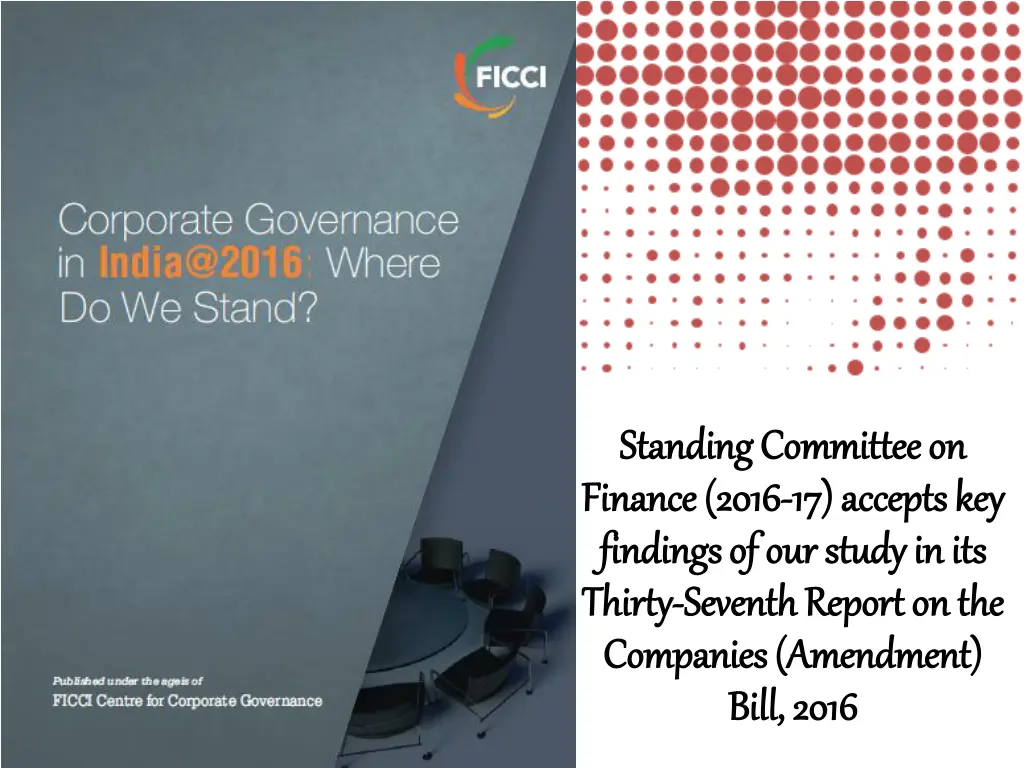
Easing Compliance Burden on Smaller Companies: Key Findings and Recommendations
Discover key findings and recommendations of the Finance Committee regarding the Companies (Amendment) Bill, 2016. Learn about calls for differential treatment to reduce compliance burdens on smaller entities, including startups and MSMEs, in India. Explore potential changes to compliance thresholds and corporate governance practices to support the growth of small businesses.
Uploaded on | 0 Views
Download Presentation

Please find below an Image/Link to download the presentation.
The content on the website is provided AS IS for your information and personal use only. It may not be sold, licensed, or shared on other websites without obtaining consent from the author. If you encounter any issues during the download, it is possible that the publisher has removed the file from their server.
You are allowed to download the files provided on this website for personal or commercial use, subject to the condition that they are used lawfully. All files are the property of their respective owners.
The content on the website is provided AS IS for your information and personal use only. It may not be sold, licensed, or shared on other websites without obtaining consent from the author.
E N D
Presentation Transcript
Standing Committee on Standing Committee on Finance (2016 Finance (2016- -17) accepts key 17) accepts key findings of our study in its findings of our study in its Thirty Thirty- -Seventh Report on the Seventh Report on the Companies (Amendment) Companies (Amendment) Bill, Bill, 2016 2016
Key Key findings findings accepted by the accepted by the Parliamentary Standing Committee Parliamentary Standing Committee 6 6 out of 1 10 recommendations given in the report have been discussed by the Committee 4 4 have been accepted for amendment in the Act
Easing the Compliance Burden on Smaller Companies including Start-Up s and MSMEs . Indian companies, especially those which are in the initial stages of their growth need the support of compliances which are less onerous and not costly to implement. This companies requisite time to gain strength, following which they could be brought into the scope of greater regulatory oversight. In that respect, the law should follow a maturity model for various entities. While amendments to the Companies Act, 2013 have exempted a cross-section of companies including private ones from rigorous compliance of the law, it could be made more broad-based companies which are in their nascent stages of development. [page 38 of our Report]. Standing Committee in para 1.20 of the Report, stated Compliance threshold should be based on business volume or turnover or scale of operations rather than the form of the company. This will ease the compliance burden for smaller companies including start- ups and MSMEs. In this regard, a distinction may also be made between corporates involving public funds and substantial employment and other enterprises operating on a smaller scale. could give such to help 3 Corporate Governance in India@2016: Where do we stand?
Compliance Burden on Smaller companies Need for a Differential Treatment . Our survey indicated that there has not been a uniform increase in the compliance cost across all types of companies. While large corporates which have already established compliance systems and have resources that can manage the extra burden, the smaller listed companies find it difficult to mobilise resources and hence find it burdensome. [page 10 of our Report]. Our report called for a differential treatmentof smaller listed companies with respect to certain onerous provisions. [page 11 of our Report] On companies a differential treatment as regards their compliance requirements, the Standing Committee in para 3.11 of the Report, stated the need to provide smaller Companies with a business volume or sales turnover of less than say, Rs. 100 crore annually, (which do not accept public deposits) whatever their form, may be treated on a different footing with simplified formats of disclosure and minimum compliance. This will also keep the compliance and scrutiny load manageable at the levels of the Registry, regulators and other mandated authorities, while facilitating 'ease of doing business' for smaller entities. Corporate Governance in India@2016: Where do we stand? 4
Making Sense of Financial and Non-financial Disclosures . Our survey indicated in the case of small listed companies, disclosure requirements have not led to significant improvements in financial and non-financial disclosures. A vast majority of the additional disclosures have not resulted in adequate benefits and are mere form over content, adding to compliance burden. [page 9 of our Report]. The report called for rationalising the disclosures by removing redundant disclosures that do not add value. [page 11 of our Report] On removing disclosure requirements that are repetitive and do not add value, while creating burden for companies, the Standing Committee in para 2.33 of the Report, stated enhanced The Committee find merit in the suggestion for a less cumbersome/ onerous Annual Return to be filed by companies. An abridged and simple form of annual return may be prescribed for small companies, one person companies companies (less than an annual sales turnover of say, Rs 100 crore). For other forms of companies as well, the annual return format should also be devised in a manner avoiding superfluous information. and private repetitive or Corporate Governance in India@2016: Where do we stand? 5
Role of Independent Director . We found that Enhanced personal and professional liability directors coupled with an insufficient risk- reward matrix acts negatively on effective performance of independent director, and also deters quality persons from taking up positions of independent directors. [page 21 of our Report]. We proposed that Independent directors must be provided greater assurance with respect to actions taken in good faith, similar to the business judgement rule. This could be issued in the form of an executive order taking into consideration the board process requirements. [page 42 of our Report]. On the need to make IDs more effective and the need to reduce their liability, the Standing Committee in para 3.26 of the Report, stated for independent The Committee is of the view that the Ministry should encourage and create a conducive and environment for the institution of Independent Directors to evolve in the country. It is not necessary or fair to saddle Independent Directors with penal liabilities. The Committee would thus expect the Ministry to review the position accordingly. positive legal Corporate Governance in India@2016: Where do we stand? 6






















